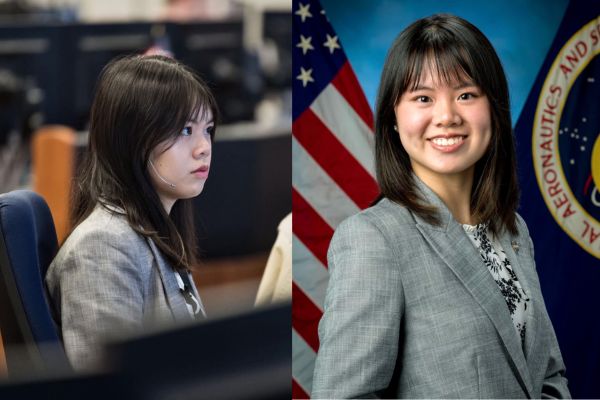Hometown: Brea, California
Year and major: Senior in biomedical engineering with a minor in space science and engineering
Awards & Activities: Vredenburg Scholarship Award; Taiwanese American Student Association (TASA); JHU Women’s Fencing
Student Spotlight: Christine Wang

Growing up, Christine Wang ’24 had a deep fascination with space exploration and dreamed of being an astronaut. Her passion for all things space has since led her to Johns Hopkins, where she is studying biomedical engineering with the goal of integrating biomedical technologies with space science.
And she’s well on her way—in addition to pursuing her degree at Hopkins, Wang is currently a NASA engineer working at Johnson Space Center. She contributes to Environmental Systems Flight Operations for the International Space Station Program, Orion, and Boeing.
For Wang, the hands-on experience gained through her co-op at NASA has enhanced what she’s learned in her classes. “It’s truly been an incredible experience that I wake up every day being so grateful for,” she said.
Wang recently shared insights into why she’s pursuing her degree at Hopkins, her experience at NASA, and her plans for the future.
How did you get interested in STEM and specifically biomedical engineering?
Taking advanced calculus and biology courses helped me realize that I wanted to pursue STEM as a career. I remember taking AP Biology and my teacher commented about my ability to grasp STEM concepts very well, and that furthered my confidence to pursue STEM.
Since I was a kid, I’ve always wanted to become an astronaut due to my curiosity about space exploration. During my internship at Boeing in high school, I spoke with my mentor about wanting to work in the space industry, but traditional engineering disciplines in that area didn’t pique my interest. However, biology really interested me. He suggested biomedical engineering and gave me an article to read. Since then, I’ve loved being a biomedical engineer!
Why did you choose to study biomedical engineering at Johns Hopkins?
Beyond the fact that JHU BME is consistently ranked so highly, the Design Team program really drew me to Hopkins. I got to talk to BME students who thoroughly enjoyed the program and expressed their confidence that the faculty and programs here would help foster my goals in biotech and leadership. I also really liked how many research opportunities are available for undergraduate students.
What are some of the most challenging or memorable classes you have taken so far?
Most of the sophomore BME courses were challenging to me, such as Systems and Controls and Statistical Physics. I really enjoyed Computational Cardiology and corresponding labs and did very well in that course. My most memorable experience is building my Design Team as a leader and, overall, the whole Design Team experience.
Tell us about working at NASA – what have been your major accomplishments there?
I cannot overstate just how transformational working at NASA has been. I highly recommend students who want to go into industry gain experience through a co-op during college. It gave me so much perspective on what my field actually looks like; I got to tour lab facilities, work in Mission Control, and speak to astronauts and flight directors.
At NASA, I have and am continuing to work on a few projects involving the International Space Station, Boeing, Orion, and space medicine research. I currently contribute to Environmental Systems Flight Operations for the ISS Program, Orion, and Boeing. Previously, I’ve worked in International Space Station Astronaut Crew Health Care Systems Project Management. There, I created flight traffic models for biomedical equipment and performed hands-on research on nanotubes that can be used for filtering liquid waste in the Bioanalytical Core Laboratory.
I also served as the Deputy Director of NASA PAXC, which is a cross-center initiative to connect young professionals from all NASA centers. I got to organize group trips, conferences, weekly meetings with NASA folks from Headquarters, and much more.
Are there are leaders in STEM who inspire you or who you want to model your career after?
Many people inspire me. First and foremost would be Ann Makosinski, a Canadian inventor and best known for her invention of the thermoelectric flashlight in 2011, which won the Google Inventor Competition. I admire her confidence and creativity when it comes to solving problems with engineering.
Another is Nicole Mcelroy, a NASA Flight Director. I got to chat with her during a NASA Flight Operations event and admire her tenacity and leadership in Mission Control. I’ve gotten to see first-hand how she communicates effectively with other flight controllers when problems arise and how well she mentors younger NASA folks.
What do you want to do with your degree?
My goal is to utilize my BME background and work experience at NASA to contribute to the field of Bioastronautics – or figuring out how to mitigate health consequences astronauts experience in space and optimizing the biological experiments in space to assist in faster drug trials for patients back on Earth. After working as a flight controller in Mission Control, I hope to pursue a PhD in this field.
Lightning Round:
What are you watching and reading right now? Ballerina on Netflix; Into the Black by Rowland White
What is the last song you listened to? “Money” by BLACKPINK’s Lisa
What is one food you’d never give up? Braised pork over rice (a traditional Taiwanese dish)
What’s one subject you’d like to learn more about? Bioastronautics!
What is one item worth spending more money on (according to you)? A nice pair of PJs – because sleeping well is incredibly important
Baltimore restaurant recommendation: KAJIKEN
